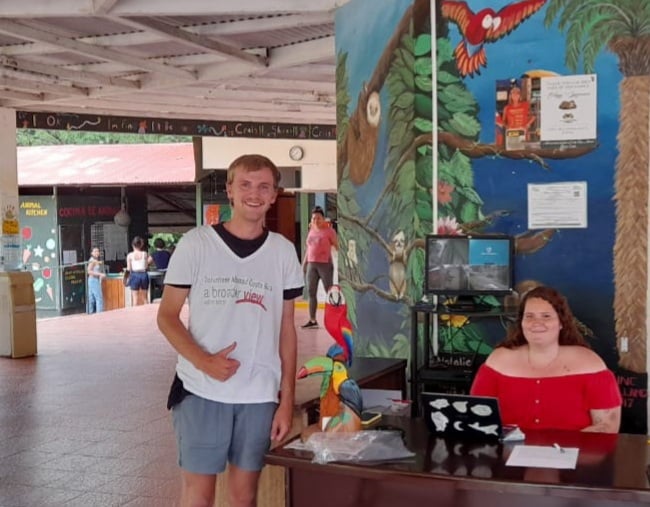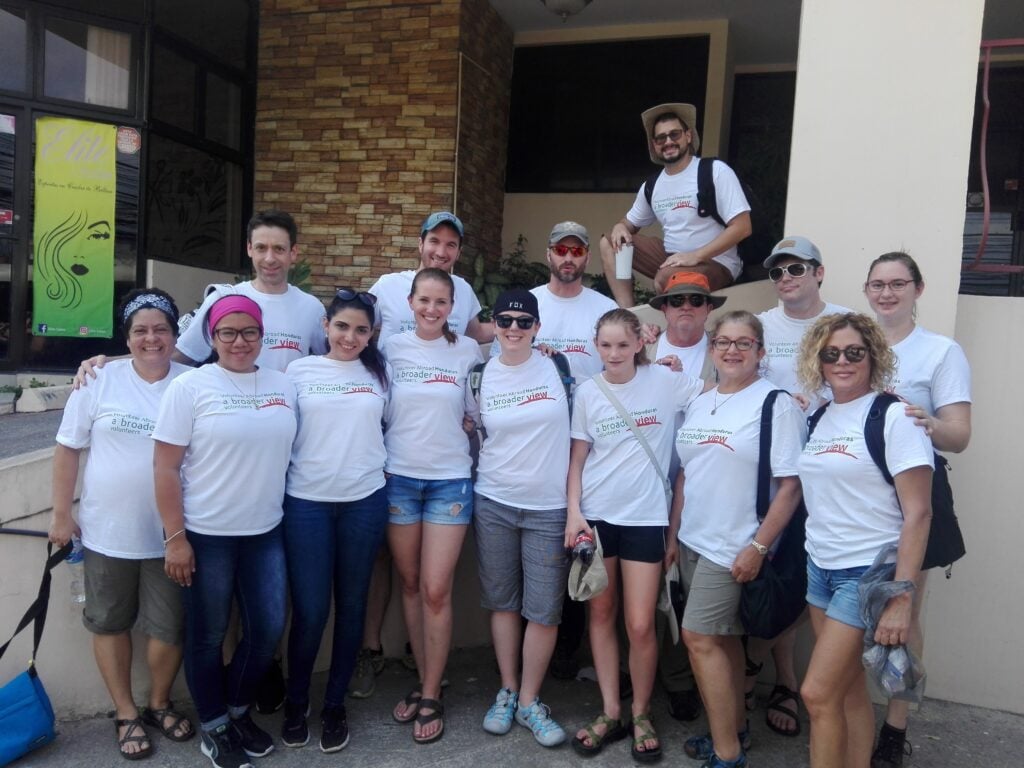Volunteering abroad is an incredible opportunity to make a positive impact while immersing yourself in a new culture. It allows you to step outside your comfort zone, gain new perspectives, and contribute to meaningful projects and initiatives. Whether you’re passionate about education, healthcare, wildlife conservation, or community development, volunteering abroad offers a chance to use your skills and abilities to create positive change.
But the rewards of volunteering abroad don’t stop there. In addition to the personal fulfillment and self-discovery you’ll experience, volunteering abroad can also enhance your professional growth. It provides opportunities to acquire valuable experience, build a global network, and develop skills that are highly sought after in today’s job market.

However, before embarking on a volunteer abroad adventure, it’s important to understand the various aspects of this experience, including the challenges that may arise and the considerations you should take into account. In this article, we’ll explore the rewards and challenges of volunteering abroad, as well as the practical steps to prepare for and navigate your volunteer experience. So, let’s dive in and discover the exciting world of volunteering abroad!
Understanding Volunteering Abroad
When it comes to making a difference in the world, volunteering abroad is an amazing opportunity that allows you to not only explore new cultures, but also contribute to meaningful projects and make a positive impact. Whether you’re passionate about education, healthcare, environmental conservation, or community development, there are countless ways to get involved and help those in need. In this section, we’ll delve deeper into the concept of volunteering abroad, its purpose, different types of volunteer programs, and popular destinations.
Definition and Purpose
Volunteering abroad is the act of dedicating your time, skills, and resources to help communities and organizations in a foreign country. The purpose of volunteering abroad is to provide assistance where it is needed, promote sustainable development, and foster cross-cultural understanding. It is a unique experience that allows you to step out of your comfort zone, challenge yourself, and make a meaningful difference in the lives of others.

Types of Volunteer Programs
There are various types of volunteer programs available for individuals who wish to contribute abroad. Some of the common types include:
- Education: Teaching English, providing academic support, or organizing educational activities for children and adults.
- Healthcare: Assisting medical professionals, raising awareness about health issues, and providing basic healthcare services.
- Conservation: Participating in environmental projects, wildlife conservation, and sustainable farming practices.
- Community Development: Supporting local communities through infrastructure projects, capacity-building initiatives, and empowerment programs.
Popular Volunteer Destinations
Volunteering opportunities can be found in almost every corner of the world, but there are some destinations that are known for their popular volunteer programs. Here are a few examples:
- Costa Rica: Renowned for its biodiversity and eco-tourism, Costa Rica offers volunteering opportunities in wildlife conservation and environmental projects.
- India: With its rich culture and diverse communities, India provides volunteer programs in education, healthcare, and women empowerment.
- Thailand: Known for its friendly people and stunning landscapes, Thailand offers volunteering opportunities in teaching, orphanages, and sustainable community development.
- South Africa: With its history and captivating wildlife, South Africa provides volunteering opportunities in wildlife conservation, education, and community development.
“Volunteering abroad allows you to explore different cultures, make new friends, and broaden your perspective on the world.”
In the next section, we’ll discuss the benefits of volunteering abroad and how it can be a life-changing experience.
Benefits of Volunteering Abroad
Volunteering abroad can be an incredibly rewarding experience that not only allows you to make a positive impact on communities in need but also helps you grow personally and professionally. Whether you’re looking to take a break from your regular routine, gain new skills, or explore different cultures, volunteering abroad offers a range of benefits that can enrich your life. Here are some of the key rewards you can expect from volunteering abroad:
Personal Growth and Self-discovery
Volunteering abroad presents a unique opportunity for personal growth and self-discovery. By stepping out of your comfort zone and immersing yourself in a different environment, you can gain a deeper understanding of yourself and your capabilities. You’ll learn to adapt to different situations, embrace uncertainty, and overcome challenges, which can enhance your confidence and resilience.
Cultural Immersion and Global Awareness
Volunteering abroad allows you to immerse yourself in a new culture and broaden your global awareness. You’ll have the chance to interact with local communities, learn about their customs and traditions, and develop a deeper appreciation for diversity. This cultural exchange can foster empathy, understanding, and a more global perspective, which is invaluable in today’s interconnected world.
Making a Positive Impact
One of the most fulfilling aspects of volunteering abroad is the opportunity to make a positive impact on the lives of others. Whether you’re teaching English to children, building homes, or providing healthcare services, your contribution can create lasting change and improve the well-being of individuals and communities. The feeling of knowing that you’ve helped someone in need is truly priceless.
Developing New Skills and Abilities
Volunteering abroad offers a platform for learning and skill development. Depending on the type of volunteer program you choose, you may have the chance to develop a wide range of skills, such as leadership, communication, teamwork, problem-solving, and cultural competence. These skills can be transferable to other areas of your life and can enhance your employability, making volunteering abroad a valuable addition to your resume.
By having different experiences from volunteering, you will grow in different ways. You will learn new things, try new strategies, and realize how much you can actually do when you believe in yourself. You will come back home feeling accomplished and proud of the things you have done.
In conclusion, volunteering abroad is not only about helping others, but also about helping yourself. It offers benefits that go beyond the time spent abroad. Volunteering abroad can be a life-changing experience that allows you to grow as an individual, gain a deeper understanding of the world, and make a meaningful impact on the lives of others. So, if you’re looking for an adventure that combines travel, personal growth, and making a difference, volunteering abroad might just be the perfect opportunity for you.
Considerations Before Volunteering Abroad
Volunteering abroad can be a life-changing experience that allows you to make a positive impact on communities around the world. Before embarking on this journey, it’s important to consider a few factors to ensure that you have a fulfilling and safe experience. Here are some key considerations to keep in mind:
Choosing the Right Volunteer Program
- Research different volunteer programs and organizations to find one that aligns with your interests and values.
- Consider the type of volunteer work you want to do, such as teaching, healthcare, conservation, or community development.
- Look for programs that have a well-established presence in the community and a track record of success.
- Read reviews and testimonials from previous volunteers to get a better understanding of the program’s reputation.
Financial and Time Commitments
- Volunteer programs often come with costs, including program fees, travel expenses, and accommodation.
- Create a budget and ensure that you have enough funds to cover these expenses.
- Consider the time commitment required for the program. Some programs may require a minimum duration of a few weeks or even months.
Language and Cultural Challenges
- Keep in mind that you may be volunteering in a country where English is not the primary language.
- Brush up on the local language or consider taking language lessons before you travel.
- Familiarize yourself with the local customs, traditions, and cultural norms to ensure respectful and appropriate behavior.
Health and Safety Precautions
- Evaluate the safety and security situation in the destination country before you travel.
- Check the travel advisories and consult with your program provider or local embassy for up-to-date information.
- Make sure you have adequate travel insurance that covers medical emergencies and evacuation if needed.
- Follow basic health precautions, such as getting necessary vaccinations and taking medication for preventive measures.
Remember, volunteering abroad requires careful planning and preparation. By considering these factors beforehand, you can ensure that you choose the right program, have realistic expectations, and enjoy a rewarding experience while making a positive impact on the lives of others.
Preparing for Volunteer Experience
Preparing for a volunteer experience abroad can be an exciting and transformative journey. It’s important to be well-prepared and organized to make the most out of your time volunteering. Here are some essential steps to help you get ready for your volunteer experience:
Researching and Selecting a Program
Before you volunteer abroad, take the time to research and choose a program that aligns with your interests and values. Consider the following factors:
- Organization: Look for reputable organizations that have a proven track record in the field of volunteering. Read reviews and testimonials from previous volunteers to get an idea of the organization’s credibility.
- Location: Decide on the country or region where you want to volunteer. Consider factors such as language barriers, cultural differences, and the specific needs and issues in that location.
- Project: Choose a project that matches your skills, interests, and passions. Whether it’s teaching, healthcare, environmental conservation, or community development, find a project that resonates with you.
- Duration: Determine how long you can commit to volunteering abroad. Some programs require a minimum time commitment, while others offer flexibility.
Applying and Securing Required Travel Documents
Once you have chosen a program, you’ll need to go through the application process and secure the necessary travel documents. Follow these steps:
- Application: Complete the application form for your chosen volunteer program. Provide all the required information, including your personal details, skills, and motivations for volunteering.
- Visa: Check the visa requirements for the country you’ll be volunteering in and apply for the appropriate visa. Make sure you allow sufficient time for the visa application process.
- Passport: Ensure that your passport is valid for at least six months beyond your planned departure date. If needed, renew your passport well in advance.
- Insurance: Purchase travel insurance that covers medical expenses, trip cancellation, and any other potential issues.
Fundraising and Budgeting for Expenses
Volunteering abroad often comes with financial costs. Here are some tips for fundraising and budgeting for your volunteer experience:
- Fundraising: Explore different fundraising options, such as crowdfunding, organizing events, or seeking sponsorships from local businesses. Share your story and explain why you’re passionate about the cause to encourage others to support you.
- Budgeting: Create a detailed budget to estimate your expenses during your volunteer experience. Consider costs such as program fees, flights, accommodation, meals, transportation, travel insurance, and additional personal expenses.
- Saving Money: Cut back on unnecessary expenses in the months leading up to your volunteer experience. Consider setting up a savings account specifically for your trip.
Packing Essentials and Cultural Sensitivity
When packing for your volunteer experience, it’s important to be mindful of the local culture and climate of your destination. Here’s what to consider:
- Essentials: Pack necessary items such as comfortable clothing, sturdy shoes, toiletries, a first aid kit, mosquito repellent, and any required medications. Don’t forget to bring important documents like your passport, visa, and travel insurance details.
- Cultural Sensitivity: Research the local customs, traditions, and dress codes of your destination. Pack clothing that is appropriate and respectful. Be aware of cultural norms and behaviors to ensure you blend in and show respect to the local community.
- Donations: If you have space in your luggage, consider bringing small gifts or donations that are needed by the local community or your volunteer program. This could include school supplies, clothing, or medical supplies.
By following these steps and adequately preparing for your volunteer experience, you’ll be equipped to make a positive impact and have a memorable and rewarding time abroad. Remember to keep an open mind, be flexible, and embrace the opportunity to learn and grow personally and professionally.
Navigating Challenges While Volunteering
Volunteering abroad can be a life-changing experience filled with growth, learning, and personal development. However, it’s important to acknowledge that it may also come with its fair share of challenges. In this section, we will explore some of the common challenges volunteers may face while volunteering abroad and offer tips on how to navigate them.
Language and Communication Barriers
One of the biggest challenges that volunteers may encounter is the language barrier. Being in a foreign country where the local language is different from your own can make it difficult to communicate effectively. Here are some tips to help you overcome this challenge:
- Learn basic phrases: Before embarking on your volunteer journey, take some time to learn a few basic phrases in the local language. Simple greetings, thank you, and please can go a long way in establishing rapport with locals.
- Utilize translation tools: Technology can be a great ally in overcoming language barriers. Carry a pocket-sized translation dictionary or use translation apps on your phone to help you communicate with locals.
- Body language and gestures: When words fail, non-verbal communication can come to the rescue. Use hand gestures, facial expressions, and body language to convey your message and understand others.
Adapting to Local Customs and Norms
Every culture has its own set of customs and norms that may differ from what you’re accustomed to. Adapting to these cultural differences can be a challenge, but it’s essential for building positive relationships and respecting the local community. Here’s how you can navigate this challenge:
- Research and learn: Before heading to your volunteer destination, familiarize yourself with the local customs, traditions, and beliefs. Understanding the cultural context will help you navigate social interactions more respectfully.
- Observe and mimic: Pay attention to how the locals behave and interact with each other. By observing and mimicking their behavior, you can quickly adapt and integrate into the community.
- Ask for guidance: Don’t hesitate to seek guidance from local staff or community members. They can provide valuable insights and advice on how to navigate the cultural nuances.
Dealing with Homesickness and Culture Shock
Being away from home and immersed in a foreign culture can sometimes lead to homesickness and culture shock. Here are some ways to manage these emotions:
- Stay connected: Maintain regular communication with your loved ones back home through calls, emails, or video chats. Knowing that you have a support system can help ease feelings of homesickness.
- Create a routine: Establishing a routine in your new environment can provide a sense of stability and familiarity. Incorporate activities that bring you joy, such as exercise, exploring the local area, or connecting with fellow volunteers.
- Seek support: Reach out to fellow volunteers, local staff, or support groups available in the community. Sharing your experiences and emotions with others who understand can be comforting and help alleviate feelings of culture shock.
Managing Workload and Stress
Volunteering abroad often involves working on projects or tasks that require dedication and hard work. It’s essential to manage your workload and stress levels to avoid burnout. Here are some tips to help you navigate this challenge:
- Set realistic expectations: Understand your own limitations and set realistic goals for your volunteer work. Don’t overcommit yourself and communicate your boundaries and availability to the project organizers.
- Practice self-care: Take time for self-care activities that recharge and rejuvenate you. Whether it’s practicing mindfulness, engaging in hobbies, or spending time in nature, prioritize activities that bring you joy and help you relax.
- Seek support: If you’re feeling overwhelmed or stressed, don’t hesitate to reach out to project coordinators or fellow volunteers for support. They may be able to help you find solutions or alleviate some of your workload temporarily.
Volunteering abroad can be a truly rewarding experience, but it’s important to be prepared for the challenges that may arise. By embracing these challenges with an open mind and utilizing the tips mentioned, you can navigate them successfully and make the most out of your volunteer journey.
Sustainable and Ethical Volunteering Practices
When volunteering abroad, it is crucial to ensure that your efforts are sustainable and ethical. Sustainable volunteering practices prioritize long-term community development and minimize negative impacts on the local environment and culture.
Ethical volunteering practices involve respecting the rights and dignity of the local community and avoiding activities that exploit vulnerable populations. By following these principles, you can contribute to positive, lasting change and make a meaningful difference in the lives of those you serve.
Working with Local Communities
- Engage with local communities: Prioritize volunteering programs that actively involve and empower local communities. This ensures that the projects are driven by the needs and aspirations of the community itself.
- Respect local leadership: Collaborate with local leaders and organizations to understand their priorities and gain their support. Their knowledge and expertise are invaluable in designing effective projects.
- Build relationships: Take the time to develop meaningful relationships with the people you work with. By cultivating mutual trust and respect, you can create a more sustainable and impactful volunteer experience.
Responsible Tourism and Impact
- Choose responsible tour operators: Select volunteer programs that work with responsible and sustainable tour operators. These operators prioritize environmental conservation, support local economies, and promote cultural preservation.
- Minimize your environmental footprint: Consider the environmental impact of your volunteer activities and take steps to minimize your footprint. This may include conserving water, reducing waste, and respecting local flora and fauna.
- Support local businesses: Opt to stay in locally-owned accommodations, eat at local restaurants, and purchase goods and services from local markets. This helps to stimulate the local economy and ensures that your contribution has a positive, lasting impact.
Avoiding Orphanage Tourism
- Understand the consequences: Orphanage tourism, or visiting and volunteering in orphanages, can have harmful effects on vulnerable children. It can disrupt their emotional and social development and perpetuate the cycle of institutionalization.
- Support family-based care: Instead of supporting orphanages, focus on programs that promote family-based care and community support. This includes supporting foster care initiatives and community-based organizations that provide family support services.
- Volunteer responsibly: If you are volunteering with children, ensure that the program follows best practices and guidelines for child protection. Respect the privacy and rights of the children, and prioritize their well-being above all else.
Supporting Long-term Development
- Emphasize sustainable projects: Choose volunteer programs that prioritize long-term development and capacity building. These projects focus on equipping the local community with the skills and resources they need to thrive independently.
- Advocate for systemic change: In addition to direct volunteer work, engage in advocacy efforts that address the root causes of social and environmental issues. Use your voice to raise awareness and promote sustainable and equitable development.
- Stay involved: Even after your volunteer experience ends, continue to support the projects and initiatives you were involved in. Whether through fundraising, advocacy, or volunteering remotely, your ongoing commitment can have a lasting impact on the community.
By adhering to sustainable and ethical volunteering practices, you can ensure that your efforts make a positive and lasting impact. Remember, it’s not just about the time you spend volunteering – it’s about the responsible and respectful manner in which you engage with the local community and contribute to their long-term development.
Volunteering Abroad as a Career Boost
Volunteering abroad offers more than just the opportunity to make a positive impact on the world. It can also be a valuable experience for personal and professional growth. If you are considering volunteering abroad, you may be wondering how it can benefit your career. In this section, we will explore the ways in which volunteering abroad can boost your career and help you stand out in the job market.
Acquiring Valuable Professional Experience
One of the key benefits of volunteering abroad is the chance to gain practical experience in your field of interest. Whether you are a healthcare professional, a teacher, an environmentalist, or an aspiring social worker, there are volunteer programs available that align with your career goals. By volunteering abroad, you can:
- Apply your skills and knowledge in a real-world setting
- Gain hands-on experience working with diverse populations
- Develop problem-solving and critical thinking skills
- Improve your cross-cultural communication abilities
These experiences can significantly enhance your resume and make you a more attractive candidate for future job opportunities. Employers value candidates who have demonstrated their commitment to global issues and have experience working in multicultural environments.
Building a Global Network
Volunteering abroad allows you to build a network of like-minded individuals from around the world. You will have the opportunity to collaborate and form meaningful connections with volunteers, local community members, and professionals in your field. Networking while volunteering abroad can:
- Provide you with valuable contacts and references
- Open doors to international job opportunities
- Expose you to different perspectives and approaches to work
Expanding your network on a global scale can be an invaluable asset as you progress in your career. It can lead to new opportunities, collaborations, and even mentorship relationships.
Enhancing Cultural Competence
In today’s globalized world, cultural competence is highly valued by employers. By volunteering abroad, you embark on a journey of cultural immersion and develop a greater understanding and appreciation for different cultures and perspectives. This enhanced cultural competence can:
- Make you more adaptable and open-minded in professional settings
- Improve your ability to work with diverse teams and clients
- Give you a competitive edge in international job markets
Employers increasingly seek candidates who demonstrate cultural sensitivity and the ability to navigate intercultural dynamics. Volunteering abroad provides a unique opportunity to develop and showcase these skills.
Developing Leadership and Problem-solving Skills
Volunteering abroad often presents unique challenges that require leadership and problem-solving skills to overcome. By taking on responsibilities, making decisions, and adapting to unfamiliar situations, you can develop and strengthen these abilities. Volunteering abroad can help you:
- Build resilience and the ability to think creatively in challenging situations
- Hone your decision-making and problem-solving skills
- Gain confidence in your leadership abilities
These skills are highly transferable and sought after in various professional settings. Volunteering abroad provides a dynamic and immersive environment for honing these skills and showcasing them to potential employers.
In conclusion, volunteering abroad offers numerous career benefits. It provides valuable professional experience, helps you build a global network, enhances your cultural competence, and develops leadership and problem-solving skills. These benefits can give you a competitive edge in the job market and open doors to new career opportunities. If you are looking to boost your career while making a positive impact, volunteering abroad is a perfect choice.

Post-Volunteering Reflection and Impact
Volunteering abroad is a life-changing experience that can have a lasting impact both on the volunteers and the communities they serve. After completing your volunteer program, it’s important to take some time to reflect on your experience and consider the impact you have made. Here are some key points to consider:
Returning Home and Readjusting
- Reentry shock: Returning home after volunteering abroad can sometimes be challenging. You may experience a sense of disorientation or even sadness, as you readjust to your familiar surroundings. This is known as reentry shock.
- Processing emotions: It’s important to give yourself time and space to process your emotions after returning home. Reach out to friends, family, or fellow volunteers who can provide support and understanding. You may also consider joining post-volunteering support groups or online communities to connect with others who have had similar experiences.
- Reflecting on your experience: Take some time to reflect on your volunteering experience. What were the most memorable moments? How did the experience impact you personally? Consider keeping a journal or writing a blog post to document your thoughts and feelings.
Sharing Experiences and Inspiring Others
- Storytelling: Share your volunteering experiences with others. Whether it’s through social media posts, blog articles, or informal conversations, storytelling can be a powerful way to create awareness and inspire others to get involved in volunteer work.
- Speaking engagements: Consider giving presentations or talks about your volunteer experience. Local schools, community organizations, or even corporate events may be interested in hearing your stories and insights. This can be a great way to raise awareness and encourage others to take action.
Supporting Sustainable Development Projects
- Financial contributions: If you are in a position to do so, consider making a financial contribution to support sustainable development projects in the community where you volunteered. Many organizations have ongoing initiatives that require funding to continue making a positive impact. Every bit helps, and even a small donation can make a difference.
- Fundraising efforts: Organize fundraising events or campaigns to raise money for a cause that aligns with your volunteer experience. This could be a charity run, a bake sale, or an online crowdfunding campaign. Get creative and involve your friends, family, and community in supporting the cause.
Continuing Involvement in Volunteer Work
- Local volunteering opportunities: Look for volunteering opportunities in your local community. There are often organizations and initiatives that can benefit from your time and skills. Get involved and continue making a positive impact close to home.
- International volunteering: If you’re passionate about volunteering abroad, consider future opportunities to continue your work in different countries and communities. There are countless organizations that offer volunteer programs internationally, allowing you to explore new cultures and make a difference on a global scale.
Volunteering abroad is not just a one-time experience; it has the potential to shape your future and the lives of others. By reflecting on your experience, sharing your stories, supporting sustainable development projects, and continuing your involvement in volunteer work, you can truly make a lasting impact and inspire others to join the journey.
Conclusion
Congratulations! You have now gained a comprehensive understanding of the rewards and challenges of volunteering abroad. Here are a few key takeaways to remember:
- Volunteering abroad can be a life-changing experience, offering personal growth, cultural immersion, and the opportunity to make a positive impact on communities in need.
- Before embarking on your volunteer journey, carefully consider factors such as the type of program, financial commitments, language and cultural challenges, and health and safety precautions.
- Proper preparation is crucial for a successful volunteer experience. Research and select a program that aligns with your goals, secure necessary travel documents, budget for expenses, and pack essentials while being culturally sensitive.
- Navigating challenges while volunteering requires adaptability, resilience, and effective communication. Be ready to face language barriers, adjust to local customs, manage homesickness, and handle workload and stress.
- Remember to practice sustainable and ethical volunteering. Work with local communities, support responsible tourism, avoid orphanage tourism, and focus on long-term development.
- Volunteering abroad can also be a great boost to your career. It offers valuable professional experience, helps build a global network, enhances cultural competence, and develops leadership and problem-solving skills.
- After completing your volunteer experience, take time to reflect, share your experiences with others, support sustainable development projects, and continue your involvement in volunteer work.

By volunteering abroad, you have the opportunity to make a meaningful impact in the lives of others while also enriching your own. So go out there, explore the world, and make a difference! Remember, as Robert Louis Stevenson once said, “Don’t judge each day by the harvest you reap but by the seeds that you plant.” Happy volunteering!
Frequently Asked Questions
- What are the benefits of volunteering abroad?Volunteering abroad offers numerous benefits such as gaining valuable life and cultural experiences, expanding your global perspective, developing new skills, making a positive impact, and creating lasting memories.
- What types of volunteer opportunities are available abroad?There are various types of volunteer opportunities available abroad, including education and teaching, healthcare and medical assistance, environmental conservation, community development, orphanage work, wildlife conservation, and construction projects.
- What challenges may volunteers face while working abroad?Volunteers may face challenges such as language barriers, cultural differences, homesickness, adapting to new living conditions, lack of resources, and encountering unfamiliar or difficult situations.
- How do I find reputable volunteer programs abroad?To find reputable volunteer programs abroad, do thorough research, read reviews and testimonials, check if the organization is registered and accredited, evaluate their impact and sustainability, and consider seeking recommendations from friends, family, or online communities.
- Is it necessary to have previous experience to volunteer abroad?While some volunteer programs may require specific skills or qualifications, many do not require previous experience. There are opportunities available for individuals with diverse backgrounds and skill sets, as long as they have the passion and willingness to contribute.



